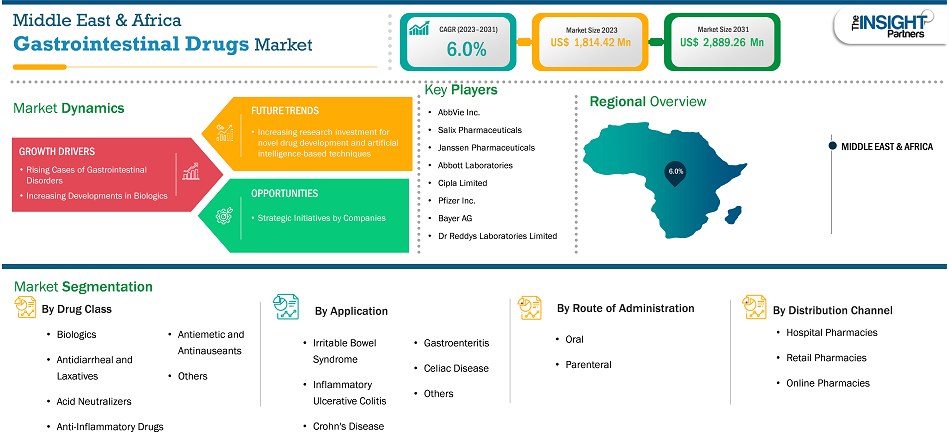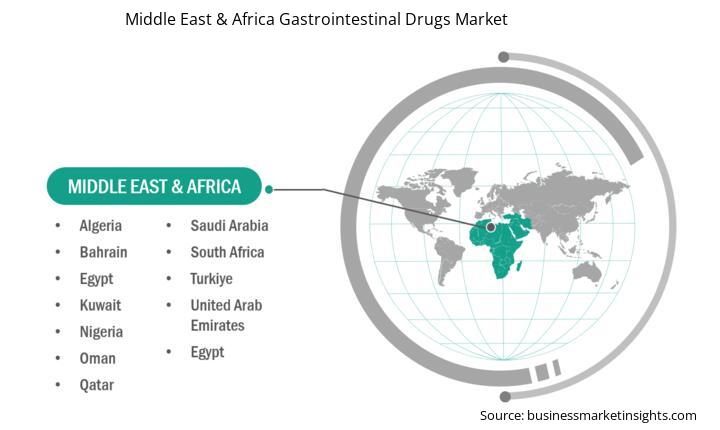The Middle East & Africa gastrointestinal drugs market size is expected to reach US$ 2,889.26 million by 2031 from US$ 1,814.42 million in 2023. The market is estimated to record a CAGR of 6.0% from 2023 to 2031.
Middle East & Africa consists of three major countries namely United Arab Emirates (UAE), Saudi Arabia, South Africa, and the Rest of MEA. Saudi Arabia is the largest market for gastrointestinal drugs. The market is driven by factors such as increasing government initiatives and rising in prevalence of gastrointestinal diseases.
Middle East & Africa Gastrointestinal Drugs Market Segmentation Analysis:
Key segments that contributed to the derivation of the gastrointestinal drugs market analysis are drug class, application, route of administration, and distribution channel.
Companies operating in the gastrointestinal drugs market constantly focus on strategic developments such as product approvals, collaborations, funding, agreements, and new product launches, which help them improve their sales, increase their geographic reach, and improve their capacities to cater to a greater than existing customer base. A few strategic initiatives taken by key players operating in the gastrointestinal drugs market are mentioned below:
Therefore, strategic initiatives by various companies focusing on the development of drugs for the treatment of digestive diseases are likely to offer growth opportunities to the gastrointestinal drugs market in the coming years.
Based on country, the Middle East & Africa gastrointestinal drugs market comprises Saudi Arabia, South Africa, the UAE, and the Rest of Middle East & Africa. South Africa held the largest share in 2023.
In South Africa, a variety of conditions remains undiagnosed, which highlights the need for awareness of diseases such as IBS, outlet dysfunction, constipation, and colon cancer symptoms, as well as the importance of early diagnosis. The issues associated with constipation increase with age. The South African Gastroenterology Society (SAGES) reports that older adults are five times more likely to develop constipation-related problems. According to the article titled “Everything You Need to Know about Irritable Bowel Syndrome,” published in March 2021, approximately 8% of the country’s population (~4.6 million South Africans) suffer from IBS, at least one day per week on average, in the last three months.
In recent years, new agents for constipation control have been introduced, requiring the shortcomings of current therapies, particularly for the treatment of opioid-induced constipation and other inflammatory bowel disorders or severe pelvic floor dysfunction. Several of these drugs are licensed and used in South Africa. For example, Lubiprostone is approved for adult chronic idiopathic constipation and opioid-induced constipation.
Middle East & Africa Gastrointestinal Drugs Market Company Profiles
Some of the key players operating in the gastrointestinal drugs market include Sanofi SA, GSK Plc, Johnson & Johnson, Bausch Health Companies Inc, AstraZeneca Plc, AbbVie Inc, Bayer AG, and Pfizer Inc among others. These players are adopting various strategies such as expansion, product innovation, and mergers and acquisitions to provide innovative products to their consumers and increase their market share.
The following methodology has been followed for the collection and analysis of data presented in this report:
The research process begins with comprehensive secondary research, utilizing both internal and external sources to gather qualitative and quantitative data for each market. Commonly referenced secondary research sources include, but are not limited to:
Note: All financial data included in the Company Profiles section has been standardized to USD. For companies reporting in other currencies, figures have been converted to USD using the relevant exchange rates for the corresponding year.
The Insight Partners’ conducts a significant number of primary interviews each year with industry stakeholders and experts to validate its data analysis, and gain valuable insights. These research interviews are designed to:
Primary research is conducted via email interactions and telephone interviews, encompassing various markets, categories, segments, and sub-segments across different regions. Participants typically include:

| Report Attribute | Details |
|---|---|
| Market size in 2023 | US$ 1,814.42 Million |
| Market Size by 2031 | US$ 2,889.26 Million |
| CAGR (2023 - 2031) | 6.0% |
| Historical Data | 2021-2022 |
| Forecast period | 2024-2031 |
| Segments Covered |
By Drug Class
|
| Regions and Countries Covered |
Middle East and Africa
|
| Market leaders and key company profiles |
|

The Middle East & Africa Gastrointestinal Drugs Market is valued at US$ 1,814.42 Million in 2023, it is projected to reach US$ 2,889.26 Million by 2031.
As per our report Middle East & Africa Gastrointestinal Drugs Market, the market size is valued at US$ 1,814.42 Million in 2023, projecting it to reach US$ 2,889.26 Million by 2031. This translates to a CAGR of approximately 6.0% during the forecast period.
The Middle East & Africa Gastrointestinal Drugs Market report typically cover these key segments-
The historic period, base year, and forecast period can vary slightly depending on the specific market research report. However, for the Middle East & Africa Gastrointestinal Drugs Market report:
The Middle East & Africa Gastrointestinal Drugs Market is populated by several key players, each contributing to its growth and innovation. Some of the major players include:
The Middle East & Africa Gastrointestinal Drugs Market report is valuable for diverse stakeholders, including:
Essentially, anyone involved in or considering involvement in the Middle East & Africa Gastrointestinal Drugs Market value chain can benefit from the information contained in a comprehensive market report.
Please tell us your area of interest
(Market Segments/ Regions and Countries/ Companies)